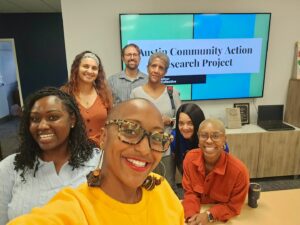By: Jonathan Widell, Marketing & Development Specialist at Austin Coming Together
In Austin, a major health crisis has afflicted its residents for years. The area’s vibrant community is often overshadowed and neglected due to untreated mental health issues and trauma. With the city closing public mental health centers and the challenges from the pandemic, we have seen the issue of mental health become a high priority for community members.
THE CHALLENGE
While there are service providers in Austin doing great work, many residents are still left to navigate these struggles alone. In addition to an increase in services and accessibility, better collaboration and overall awareness are necessary to meet the need for mental health services in the community. Plus, a stigma around utilizing resources or fear of judgment may hold individuals back. A group of Austin youth created their own quality-of-life plan and selected mental health as a priority for the community, reinforcing why one of the focuses of the Austin Forward. Together. (AFT) Highlighted Agenda is addressing mental health.
Over the past five years, Austin has made major strides in its overall AFT quality-of-life plan, but the mental health actions in the plan have yet to be implemented. Recently, through the AFT Highlighted Agenda, we will be able to be more intentional about addressing the mental health action items across the AFT quality-of-life plan, and shift resources from across task forces to focus on this initiative as a priority. This will allow us to make sure mental health services are integrated with other services and efforts in food access, workforce development, education, and housing.
BUILDING CONNECTIONS
In June 2023, ACT convened with over 30 partners from diverse sectors. Groups included mental health providers, churches, youth-serving organizations, and early childhood experts, connecting through a restorative justice circle to establish trusted relationships. Since the initial meeting last year, the focus shifted to discussing barriers we face and ideas of how we can work together to address them. Open discussions led to an agreement that we want to work together on a neighborhood-wide strategic action plan to expand mental health services for young children, youth, and families in Austin.
NEXT STEPS
Realizing that a strategy to address mental health in Austin depends on understanding the local context, earlier this summer we partnered with the Black Researchers Collective to advance racial equity by training and equipping community members with research tools to be more civically engaged and policy-informed. Over the course of three workshops, residents learned the basics of doing grassroots research. Through this partnership, we were able to hire two community researchers to work with us for a six month period to help better grasp the mental health landscape through focus groups with residents to understand the community needs, and surveys with mental health providers to get a holistic picture of the current assets in the community. Their findings are crucial in shaping our strategic plan surrounding the Mental Health Initiative, with the goal of finalization by early next year.
A FUTURE OF HEALING
The journey towards addressing the mental health crisis in Austin is ongoing, but the progress made so far offers hope. By uniting a diverse group of partners, meaningfully engaging the community, and developing a strategic plan, we are not just addressing immediate needs, but we are laying the framework for lasting change in Austin. While we anticipate challenges, we will continue to collaborate and dedicate ourselves to ensuring the community is on a path to a healthier, more equitable future, and will not leave any residents behind.
Austin Coming Together is seeking local leaders to join the AFT Task Forces carrying out the AFT plan and Highlighted Agenda. LEARN MORE AT austincomingtogether.org/qlp



